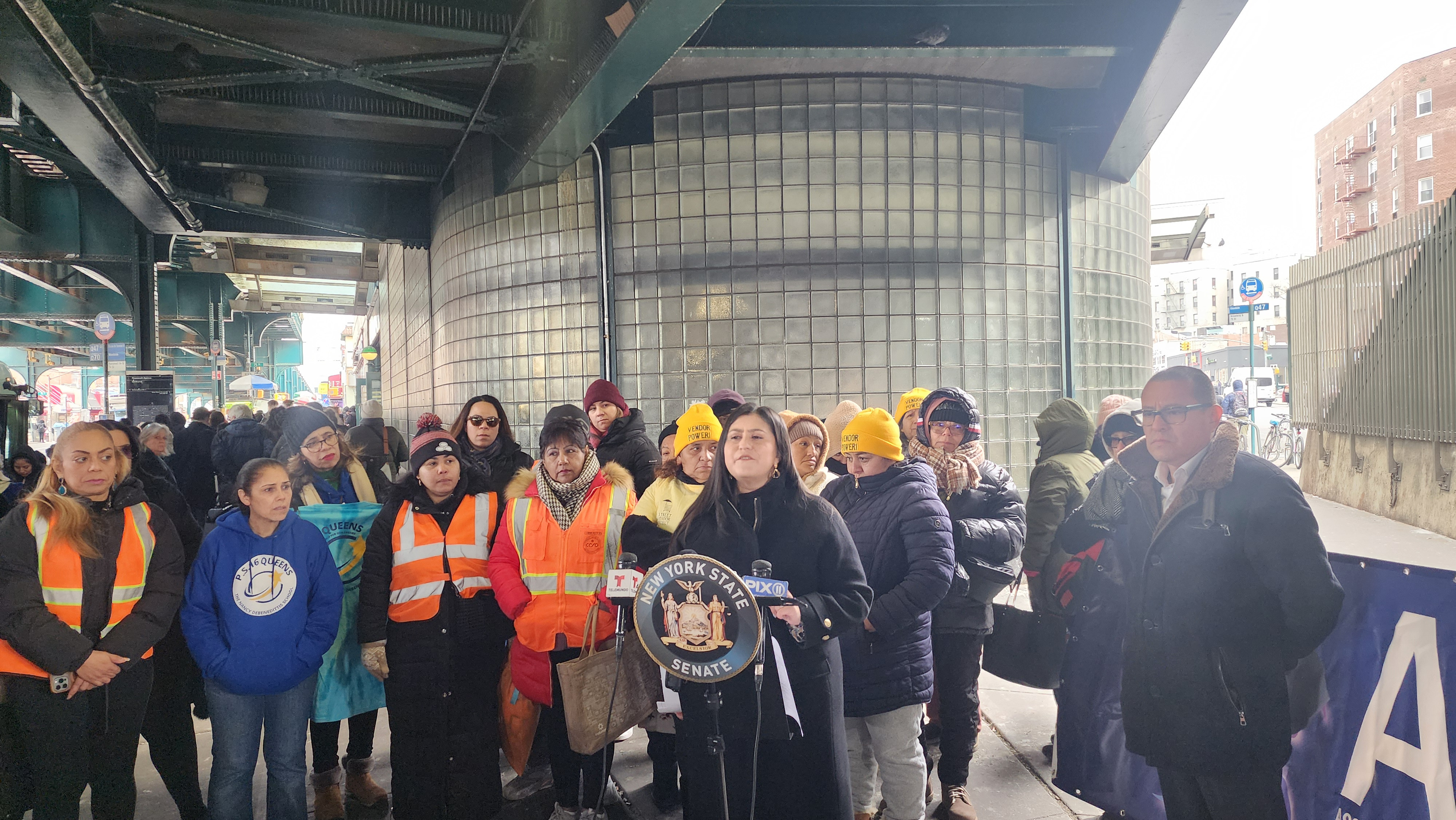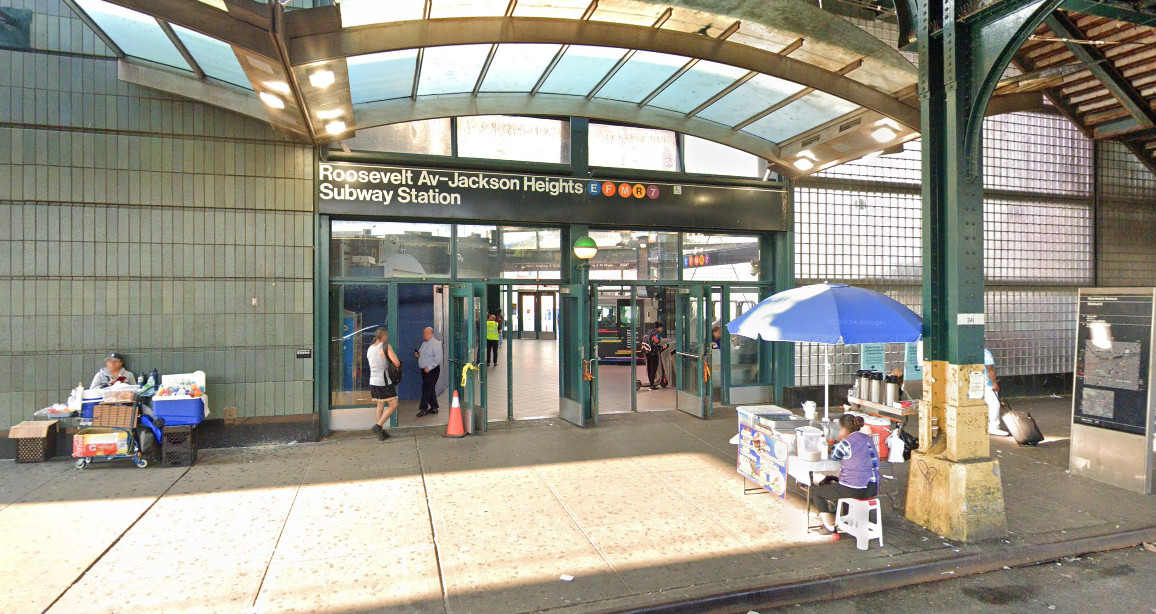State Senator Jessica Ramos is championing a significant redevelopment initiative for the 74th Street-Broadway subway station in Jackson Heights, Queens. This proposal is part of a larger strategy to enhance the quality of life along Roosevelt Avenue, a bustling commercial corridor and vital artery of the neighborhood.
Speaking near the station on Thursday, Senator Ramos announced her commitment to securing further state funding to modernize the station and introduce new retail spaces. She highlighted the station’s crucial role as a primary entry point into New York City for tourists arriving via LaGuardia Airport, emphasizing its connection through the Q70 bus line.
While acknowledging the existing $25 million earmarked for elevator installations at the station, Ramos asserted that this allocation is insufficient to fully realize the station’s potential and improve its contribution to the local community. She envisions a more comprehensive upgrade that addresses both functional and aesthetic aspects of the transportation hub.
 State Sen. Jessica Ramos speaks about quality of life issues on Roosevelt Avenue outside the 74 St-Broadway subway station in Queens.
State Sen. Jessica Ramos speaks about quality of life issues on Roosevelt Avenue outside the 74 St-Broadway subway station in Queens.
Enhancing the Gateway to Jackson Heights
“We believe that updating and improving the 74th Street station is, of course, going to help make our neighborhood more beautiful,” Ramos stated at a press conference held just outside the station on January 16th. Her vision extends beyond mere cosmetic improvements, aiming to transform the station into a welcoming and efficient space that reflects the vibrant character of Jackson Heights.
The press conference was attended by various local leaders and representatives from the Street Vendor Project, a prominent advocacy group for street vendors throughout New York City. Together, they voiced a unified call for sustained, long-term investments in the area to tackle ongoing quality-of-life challenges that impact residents and businesses alike.
Senator Ramos specifically underscored the necessity for community-driven initiatives to tackle crime and bolster public safety on Roosevelt Avenue. She pointed to persistent issues such as prostitution, shoplifting, and the accumulation of refuse as key areas needing attention. Her approach emphasizes a holistic strategy that combines infrastructural improvements with social and economic support for the community.
Contrasting Approaches to Roosevelt Avenue’s Challenges
Ramos also voiced criticism of Mayor Eric Adams’ Operation Restore Roosevelt, a recently concluded 90-day policing initiative designed to address quality-of-life concerns in the area. While Council Member Francisco Moya, who co-launched the operation, indicated its indefinite continuation, Senator Ramos expressed doubt about its long-term effectiveness and strategic direction beyond the initial phase.
 74th Street-Broadway Subway Station in Jackson Heights via Google Maps highlighting its location and surrounding streets.
74th Street-Broadway Subway Station in Jackson Heights via Google Maps highlighting its location and surrounding streets.
Ramos argued that the policing-focused approach disproportionately affected vulnerable immigrant women through arrests, without effectively targeting the underlying issues of exploitation and trafficking. She contended that the operation primarily penalized individuals engaged in coerced prostitution rather than addressing the systemic problems driving it. According to Ramos, the increased police presence inadvertently deterred foot traffic due to fear among undocumented residents, while failing to deter gang activity.
“The vast majority of these women are not engaging in prostitution because they wanted to, but because they’re forced to,” Ramos explained, emphasizing the need for nuanced solutions beyond law enforcement.
Investing in Economic Empowerment and Community Infrastructure
Senator Ramos proposed alternative strategies centered on economic empowerment and community development. She suggested increasing the number of permits for street vendors and expanding work permits for undocumented immigrants as means to provide legitimate employment opportunities, thereby reducing reliance on unlicensed street vending and sex work driven by economic necessity.
Further infrastructure improvements, such as sidewalk repaving and the installation of LED lighting under the elevated 7 train line, were also proposed to enhance public safety and the overall pedestrian experience along Roosevelt Avenue. These measures aim to create a more welcoming and secure environment for residents, businesses, and visitors.
Ramos advocated for the passage of the Pro-Banking Act, which would enable IDNYC holders to open accounts at state-chartered banks, promoting financial inclusion for all New Yorkers. She also called for a significant $100 million investment in the Ellis Island Ready to Work Initiative, designed to establish workforce training and regional development centers for immigrants ready to enter the workforce.
Addressing the issue of persistent trash accumulation, Ramos pointed out the decreasing number of public trash cans along Roosevelt Avenue over the past three years. She argued that this scarcity unfairly burdens immigrant street vendors by hindering their ability to maintain cleanliness, inadvertently casting them as scapegoats for the wider sanitation problem.
 Mayor Adams and Council Member Moya visit Roosevelt Avenue to discuss Operation Restore Roosevelt and its initiatives to improve quality of life.
Mayor Adams and Council Member Moya visit Roosevelt Avenue to discuss Operation Restore Roosevelt and its initiatives to improve quality of life.
Krystle Jimenez, principal of PS19Q in Corona, emphasized that community policing is only “one piece” of a comprehensive approach to improving quality of life on Roosevelt Avenue. She stressed the importance of creating a safe and valued community for students and residents alike.
Freddy Castiblanco, founder of Jackson Heights’ Terraza 7 music venue, echoed this sentiment, stating that issues like prostitution stem from economic hardship. He emphasized that investments in health, education, and small businesses are crucial for tackling the root causes of the neighborhood’s challenges and fostering sustainable improvement. “Operation Restore Roosevelt, a set of punitive measures, falls short if it is not accompanied by initiatives that promote economic and human development,” Castiblanco asserted.
In response, the Mayor’s office highlighted the successes of Operation Restore Roosevelt, stating that it led to the closure of numerous illegal brothels and sex shops within its 90-day duration. They also noted that the NYPD’s Human Trafficking Squad offered services to over 100 individuals as part of the operation, demonstrating a multi-faceted approach. “This work is noticeably improving life in the neighborhood — so much so that community groups have publicly called for us to extend the operation — while offering vital services to vulnerable populations in hopes of improving their lives,” stated Kayla Mamelak, a spokesperson for Mayor Adams.
Sources close to the Mayor’s office indicated that Senator Ramos, due to her lack of direct involvement in Operation Restore Roosevelt, would not be privy to detailed plans for its potential extension. This underscores the differing perspectives and approaches to addressing the complex challenges facing Roosevelt Avenue and the 74th Street-Broadway station area.
